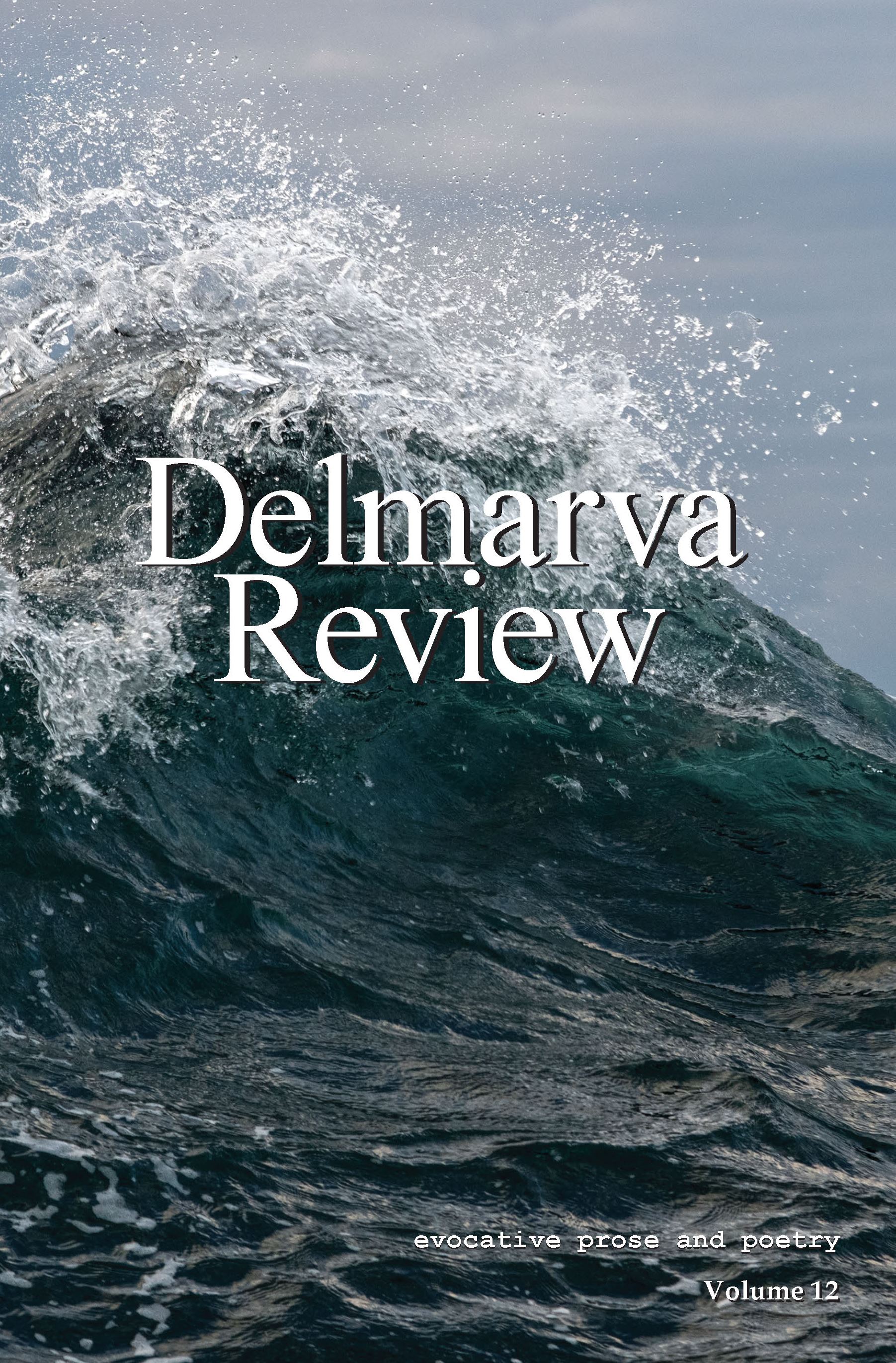DEPARTURES was produced as a radio broadcast by Delmarva Radio Theatre, hosted by Hal Wilson. Check it out here.
Bohdan Dowhaluk
Departures
Excerpt from Delmarva Review Volume 13. Adapted for podcast production by Delmarva Radio Theatre.
“THIS WILL RUIN MY LIFE,” said the recording. The red light on the answering machine had stopped blinking. “With the B you gave me, I will never get into graduate school now. I thought I would die when I saw the posting.” A tremor dominated the message.
The student failed to identify herself. Trying to guess the identity of the caller—there were many Bs in the class—he replayed the message, but the fidelity of the caller’s voice was poor since the machine was old, one of the last in the department if not one of the last on campus. He decided that any resolution to this problem could wait until he returned from his conference. For a paleontologist, appreciating time was an art. Life-and-death issues were evaluated from a different perspective.
Yet the complaint was not a surprise. He was honest enough about himself to realize that both his colleagues in the anthropology department and his students—he was the only true paleontologist teaching in a very small school that probably had no business offering an anthropology degree—had written him off as a has-been, hiding behind the fine print of his rights as a tenured professor. In a sense, they were right, and he was ready and happy to leave. This semester was to be his last before he finally retired. The occasional tremble in his hands and the slight stoop that he had developed of late—even he noticed it—made one part of him side with his detractors. He thought that a pain in his chest indicated that something also was wrong with his heart, but at other times the pain reminded him of a bruised rib. At one point, the pain was so severe and sudden that it pulled him to the ground onto all fours. The doctors were skeptical of his claims and assured him that he had not suffered a heart attack.
He came to feel that ghostly hyenas, academic, social, and medical, were pursuing him, waiting for any opportunity to laugh or to attack. Yet he insisted on attending one last professional conference in order to bring closure to his career. Listening to this gathering of experts might help him ascertain whether he still loved what he expended his life on—what if it was all a waste, after all—or whether he was expecting too much from love or from life. In preparing for the conference, he ignored the more recent and professionally fashionable controversies within his field. Of late, he had become preoccupied with one mind worm: did man first walk upright because he was fleeing predators or because he had discovered an ability to hunt something larger than berries and was surprised by a new ability to make death? Even though at times he thought that too many angels could fit on the head of this pin, he could not shake off the thought.
“ARNIE, DON’T FORGET TO TAKE OUT THE GARBAGE,” said his wife, matter of factly as she continued her knitting, with the tick-tick of the needles puncturing the silence of the room. “You don’t remember anything anymore. I have to keep reminding you.”
He mumbled to himself: “I remember so much, too much.”
She either did not hear or ignored what he said. “Ever since you lost your hair, you seemed to have lost your mind. Maybe you need to see a doctor.”
“I’m just tired. Very tired. And no, I’m not going to get a hair transplant.”
Since Alice’s second reminder earlier in the evening, he’d been thinking about the animals his granddaughter had drawn on the wall above the cans in the garage. Lucy was a sometime and current visitor who was bequeathed to them whenever her parents traveled the world by plane, by ship, and by bed. For him, either because of his forgetfulness or because he fooled himself repeatedly into the surprise of discovery, the creatures floating above the collection of garbage gave him pleasant pause every time he saw them. But after Alice offered her third reminder later in the evening, he dutifully pulled the cans to the curb, pausing to remember something that he had not witnessed in person but saw only in his imagination: how Lucy had made these marks years ago in a moment of childhood creativity, leaving a black rubbing where her wheelchair pressed against the wall. She was twelve now and drew on computers instead.
The next morning, Arnie was very ready to leave for the conference. At the airport, Alice asked him to call her if there were any changes in the return flight. She hated waiting for anything and anyone. He did not take it personally at this point. And Lucy, paying another visit to an airport and participating in another departure that was almost never hers, pulled him closer when he leaned down to kiss her in her wheelchair. She began, “I . . .” But he rushed her with his desperation. “Create something that you will always remember,” he whispered to her. “Draw, create something more.”
And she looked at him as if one part of her understood and another did not.
AT THE CONFERENCE itself, he nodded off several times during one of the few presentations he attended and circled back to his own argument with himself over whether the first man—and what does one mean by “man”?—rose to walk on two legs because of the need to escape predators or to hunt on the African savanna. Everyone else in the room seemed to focus on some other topic. He had planned to submit an article for the conference and enter the current academic fray, but after the extended time his laptop sucked from him, he reread his work and discovered near-gibberish. But as he listened to the other conference attendees engaged in a heated discussion, he surmised that they suffered from the same writing and thinking problems he did. They just did not recognize it. With almost everyone around him either tapping away on laptops or picking at the screens of computer pads, he felt as if he were back in the classroom where students either contacted each other in a kind of conspiracy of inattention or surfed the net. A woman sitting near the front of the conference room hit her laptop keys with the hard impact of someone raised on manual typewriters. He felt that he could love her for what seemed to be her spite. Her hair was dyed an unnatural fiery red.
In the elevator on his way up to his hotel room after the last session for the day, he checked his voicemails because he had heard his phone vibrate repeatedly in his pocket during the late afternoon. Usually his wife did not call, so perhaps it was his granddaughter. Instead, it was the student who had contacted him earlier. She had discovered his cell number. She struggled with many aspects of paleontology, but she was good with computers and computer searches, even for plagiarizing parts of her paper. “I hope,” said the voice message, “you realize that you are ruining my life.” As he erased the message, he muttered to himself: “Probably not. A life is hard to ruin, I hope.”
And that night, being alone in his room, he lay on his bed and stared at the cobwebs in one corner of the ceiling as they gently waved back and forth to the hum of the ventilation unit under the window like the ghostly outlines of a belly dancer. Succumbing to temptation, he opened the small refrigerator and partook of the overpriced treats. Suddenly, he felt a need to get away from the room, to go somewhere, as long as it was out, as long as it was away.
And then, as if a genie had granted him his wish, he found himself squinting at the relative brightness of the hotel corridor. While looking for a former colleague who was now teaching at another college, he lost his way and walked into a room with an opened door—Herb from Penn State was always the welcoming kind; his house was a mecca for stray dogs and cats. Arnold thought that he had found his old friend. The number on the door was right, or close to being right.
Instead, he found himself face-to-face with a woman who was more than slightly drunk. She was the red-headed typist from the conference, and the rest of her dress and demeanor somehow managed to challenge even the air around her to a fight.
“Surprise,” she said. “You and me. It’s our party. It’s all random. I like these kinds of surprises.” And she pulled him deeper into the room and quickly closed the door, leaning against it with a determined finality. He found himself standing confused in a space that, despite being a mirror copy of his room, seemed as large and threatening as an open field full of wild animals.
He remembered from a conference panel discussion that she supported the argument that hunger drove migrations across continents—or perhaps he was only imagining that his query was taken up by the entire gathering. Her hair must have been dyed because its fiery hue seemed to be an intentional cue that she was dangerous. With her quick words working on his dull and confused mind, she stoked his old embers and then brought into play the life-sized vinyl skeleton she had won as a door prize that day.
“I didn’t have a choice. It was the only thing left,” she said. As she blew up the doll again from its somewhat deflated state, she laughed as if she were inhaling nitrous oxide. At first he just stood there, confused, swaying slightly as she seemed to be giving the plastic skeleton CPR while both were standing upright.
“I have to go,” he said. “This is a mistake.”
“Oh, I know that,” she said, then grabbed him and gave him a generous kiss.
Up close, he could see her thick make-up more clearly. He could smell whatever it was the cosmetic makers mix into it: glues, he often thought. He had a very bad sense of smell his wife always told him, yet he felt that this was one of the many times she was wrong in her estimation of him. He tried not to think of her now. He did not want to hear her voice.
“Here, take this. It’s a fountain of youth.” And the woman gave him a red pill. He wondered if, upon ingesting it, he would sprout red hair in places where for most of the previous decade the fields were often barren. The hair would make them a matched couple.
“You are…younger…than I am,” he said. He looked at the pill in his hand and tried to decipher the map that was laid out in from of him in the creases of his palm.
“Who cares? We are not being scientific here. Forget data and all those details. Let’s have some time without any –ologies. No anthro, paleo, or even oncologies. We are only the pure,” and she paused, “of heart,” but then she shook her head as if she needed to find another word. “But we still can try to be free.”
Then she peeled off his name tag. “Arnold?” she said. “You need something more up-to-date. No names here, anyway. Not at this conference of ours. We don’t want to tip off either the good angels or the bad in their journal keeping. I will never call you Arnold, Arnold.” And she burst out laughing for a reason he had difficulty following at first.
He rolled the pill around in his hand. “What is this?”
“Oh, don’t be such a stiff about it. Take a chance. It’s all chance, anyway.” She grabbed him and gave him another kiss. “If chance can kill you, it can also keep you from dying. Let’s not get too particular about things.” And for some reason, she laughed so hard, like a hyena, that he thought that the sound would travel through all the vents of the hotel and into the street and beyond, until the horns of the taxis on the street finally killed it.
And he swallowed the pill with a small sip of water she offered from a glass waiting on the night stand.
“It’s all just magic,” she said, “or maybe just an M & M, peanuts and chocolate. Whatever works. As long as the cure works.” The last phrase trailed off as if she herself was relying only on hope.
Afterward, one of the few things he remembered was the vague sense of her lying next to him in bed. Her wig—“it’s real hair, I promise, but not mine,” she said—that landed on the ventilation unit under the window seemed to seethe with each gush of air coming from the louvers. With a cry inspired by a release of something primeval, she knelt next to him and began slapping his body as if to wake him. Even though her head was almost clean shaven, she was still very much a woman. Despite his trying to suppress his thinking, his overthinking, he could not help but struggle to understand what might be hiding behind her forced bravado, behind the desperation she seemed to cling to. In time, as whatever was or was not in the pill took its apparent effect, he too found that certain indecipherable something she was leading him to, and for at least one night, he clung to it for a few moments in that same confused need while they had animal sex. It hurt far less than love, it seemed, and was easier than he thought it would be.
On his way out of the room, after it seemed he had violated all parameters of time and space, he felt another vibration in his pocket. It was the student calling again. “You are ruining my life, Benedict,” she said, obviously drunk, and waiting for a response. His thinking remained blank for a while, and then he pressed “end." He wanted to keep his body feeling simply happy for a few more moments. He thought that if this student was forward enough to call him by his first name, she should have used the right one. And he thought about the final words the woman who was once a redhead said as she nudged him out of the room: “You know, for an older man, you have potential.” And she kissed him on his cheek almost tenderly. “Good luck. And when you find it, share some with me.” And she laughed but caught herself short because the hotel hallway, though empty, seemed to be alert and watching.
As he walked toward his room—he repeatedly checked his room key for the number as he almost staggered down the hall like a wounded animal—the sound of her laughter that he carried with him turned into a gurgle. In fact, he could not even be certain whether it was real, whether any of it was.
The light in the hallway seemed something alien. Someone had opened the window near the door to the emergency staircase. EXIT said the sign just to the right of it. A cold morning chill was just beginning to move in, a shiver time, when the world was still struggling to come alive and nothing yet mattered. He imagined that silent, ghostly creatures were gathering at the far end of the hallway, forming a pack and looking at each other while licking their chops.
THAT NIGHT BECAME A LINGERING MEMORY that haunted him as, back home now, he was taking out the garbage again after more prompts from Alice. Unfortunately, the headlights of a passing car brought his thinking back to his neighborhood and to the now. As he pushed the can as far back against the curb as possible, he listened to the hum of the AC units singing a benediction to the night. The houses were planted close to each other in order to be environmentally responsible said the developer of this neighborhood, but Arnold thought that argument was merely a ploy to sell houses on too-small lots. The geniuses who created the neighborhood had managed to include both “Olde” and “Village” in naming this herding of real estate deals. Arnold tried to imagine the moos of the cows that had roamed this land not too long ago.
Two houses down the street, the Palmers’ dog, loose again, was leisurely marking lamp posts as it worked its way toward Arnold along the gently curving road. The dog seemed to be spinning an invisible web connecting all things that he visited into a seemingly coherent whole.
After briefly looking up at the streetlight hanging over him, Arnold pushed down on the lid of the overstuffed can. A puff of odor escaped. He imagined living on the savanna, in the open fields, sniffing for danger or for food, with the tall grasses turned golden from the hot, blinding sun. Its dry light held dominion until the rains came and color blossomed across the fields. In the distance, he imagined several trees scattered across the African plain, as if patiently waiting for the haze to settle. The silhouette of a herd moved slowly across the horizon like a slow tide, but the indistinct shapes were too far and too small for him to decipher.
Then, suddenly, back on his own street, Arnold felt the dog that was wandering the neighborhood nuzzle him in the crotch. Startled, he shooed it away, but the dog looked back repeatedly, as if in disgust, while continuing its circuit of the street. Whenever Palmer from three houses down went on a drinking binge, his dog was always let loose, one of the few inadvertent kindnesses the animal experienced in a life otherwise spent mostly penned in a large kennel in a small yard. Invariably, when Palmer rediscovered his sobriety, he would angrily round up King, most often in the middle of the night after he would wake up from a day full of sleep and drag the dog hard on a leash back to its kennel.
After Arnold closed the garage door, made the downstairs dark, and walked up to the bedrooms, he stopped in the bathroom and began to disassemble himself for the night. Outside, the dog yelped in pleasure, it seemed, as if it had found something it liked.
Behind him in the mirror, and a little over his shoulder, Arnold thought he could see the woman again in her hotel room. He almost felt like saying “their” hotel room.
“What’s love got to do with it?” She seemed incredulous. He did not remember what his question was. She was laughing, making snow angels under the cool white sheets as she waited for him, while on a chair near the bed lay the deflated skeleton, doubled over as if it had been sick. Its slow leak could not be stopped. This was the second night. As she patted the bed, he sensed that time seemed to be of the essence.
Looking at the woman’s bald head, he remembered how, the first time she had discarded her wig with a Frisbee throw as her final act of disrobing, he had felt shock turn to pleasure. He had appreciated her honesty, but he felt that she had advanced to a place far ahead of him, that he had some catching up to do. Yet he hoped that this encounter would not really count against him in the ledger the gods kept. He was very conscious of ledgers of late. Perhaps any intimacy between two nearly bald people might be considered a healing and would not be recorded as a transgression against any code. The losses on both sides were clearly being flagged.
And then, back in the bathroom of his own house and anchored in a reality of the mere present, he brushed his teeth and washed his face.
WHILE THE COMEDIAN ON TV was enjoying himself immensely during one of his late-night monologs, Alice put down the remote, smeared lotion on her hands, and added a layer of white on her face that made her look like a ghost or a shaman. Arnold was quickly falling asleep, his face buried in his pillow so deeply one might think he was looking for something hidden inside. He had already positioned his body at the edge of the bed so that it would take less effort to roll out when his wife nudged him if he began to snore or to kick in his dreams.
“Where are you running? Those feet are driving me crazy.” This was a question that she would ask often, but she and Arnold knew there was no real answer, though Arnold would at times entertain some possible responses.
There was an unusually large explosion of laughter from the small screen that brought Arnold to the surface after he had already drifted off. He rolled back and forth as if to rewind himself back to sleep.
“You know,” said Alice, “do you know what that student of yours called you?”
Arnold returned to her from somewhere in his driftings. “For a while, she must have been calling me almost every day,” he said. “Sounded desperate. I need to call campus security and see if they can do something about that.”
“I don’t think they deal with crazies if the crazies live off campus. But you know what she did to your office while you were gone?”
“My office?”
“Security called and said another teacher caught her scrawling cuss words on the walls around your door.”
“Desperate people do that,” he said. “It’s usually a dead end.”
“She used the F word. Said that’s what you were. The security people just wanted you to know.”
“When did this happen?”
“While you were at the conference.”
Arnold hesitated. “Why didn’t you tell me when I came back?”
“Well, by then it was old news, and you seemed so preoccupied with something¾you seemed to exist in another world¾that I didn’t want to bother you. Besides, security cleaned up all the markings on the wall and door almost immediately. So, it’s like it never happened.”
He rolled over on his side and said good night and thank you, and despite his agitated thoughts, he fell asleep almost despite himself until a nudge encouraged him to prepare for the journey to the extra bedroom, to the snoratorium, as they called it.
“And she said”—his wife was talking in her near sleep just as he planted both feet on the ground next to the bed—"love you.”
He stopped his leaving.
“Who? Who said?”
His wife came closer to the surface and let out one final bubble.
“Lucy. She said she loved you.”
“When?”
“Today, yesterday. What does it matter when?” And his wife drifted off.
And he dragged his feet over to the guest bedroom.
AND HE THOUGHT HE DREAMT OF LUCY, but the line between dreaming and not was becoming less distinct of late. He thought he was sitting in her wheelchair, and she was the one standing.
“I am going,” she said.
“Where?”
“My parents are back, and they’re taking me on that hot-air balloon ride they promised and showing me the world.”
“They’re going to show you the world?”
“Yes.”
And suddenly she became so blurry he felt she was going to disappear.
“I’m so sorry,” he said. “I wanted to do that. To teach you.”
And at that moment he felt a pain in his back as he often did when he would lift her from her chair when she was younger and try to move her to a new place. But the pain was worth it, just to hold her close for a few moments and feel her arms around his neck, her intertwined fingers trusting and her face next to his, exuding hope.
“I need . . .” but the dream collapsed into an empty blankness before he could finish saying what he wanted to say.
HE WAS AWAKENED BY THE WOMAN’S BODY that at the point of contact with him seemed to be on fire. He was in the hotel room again. Then he realized that he was not dreaming but remembering. At his side, he could see in the half light of the bathroom door left slightly ajar that she was sweating profusely, beads rolling down her face as if she were running a fever. This change was a far cry from the moment much earlier in the evening when he had rolled over after he thought she might have broken one of his ribs, or perhaps stolen it for herself as a kind of cavewoman’s trophy. In the few words they exchanged after the deed, he saw that she did not share his sense of fall but, in fact, seemed happy, but in an uneasy way, as if happiness might not be enough. Now that she was wet with what seemed to be a fever, confusion swept over him for a few moments, but then he pulled up their bedsheet and wiped her face gently.
Even though he did not know her name, he felt that he had known her all his life. As he watched her lean away and take some pills together with a drink of water from a glass on the nightstand, he did not want her to disappear over the edge of the bed. He was afraid of that edge, though he did not know whether this fear was for her sake or for his.
And when she turned back to him after placing the pill bottle back on the nightstand, she said, “It’s nothing that you can catch, dearie. So, don’t worry. I don’t think you ever had what I lost. We’re not just talking about body parts here.”
And he remembered how she laughed awkwardly again at some joke he did not understand. It was not the animal laugh from earlier in the evening but something else, as if she were trying to cheer up someone in the room. He wondered who else it could be: certainly not the skeleton now lying flat on the floor, not himself, but then with the impact of almost a physical kick to his side, he was overcome with awe over how lonely she must be. For a moment, he wanted to do something to help her but did not know what he could do.
After he finished his business in the dark—the clock in his own guest bedroom where he was sleeping read 1:11 when he left the bed—he decided to just sit on the closed commode seat and think. But then a sound outside caused him to open the window shade. Everything in the yard was transformed by the silver-white light of the moon. And there was Palmer, pulling his dog across the lawn, the leash straining. King was offering a good but relatively quiet fight in return.
Once back in bed in the snoratorium, Arnold tried to lie on his back, but as he reached across the empty bed, he was distracted by a vulture he saw sitting in the corner of the room. Arnold closed his eyes, but the bird was still there. He was not sure whether he was dreaming or remembering. Past the vulture, Arnold saw the savanna, the expanse that seemed to end at the horizon but only because the eye or the mind could not deal with anything beyond. A small herd of something hovered in the distance like an unstable mirage and a dog, but not Palmer’s dog, moved about restlessly at his side. Arnold felt uncomfortable with this loyalty from a strange animal. This pairing might have reflected a reciprocal need, but then he realized he should not overthink the situation because he was on a hunt and events were unfolding quickly. He must pay attention and be alert.
Scattered bones covered the ground all around him. Some looked to be human and some seemed different. He wanted to stoop to examine these remains—perhaps they had answers—but a sense of urgency propelled him forward. The vulture, now clearly sitting in a tree, dipped its head lower to observe better. As Arnold began to walk faster into the ever-deepening twilight, unbending his aching back, running now, almost losing touch with the ground, he soon reached the herd. They were buffalo. He was very hungry and felt that he could kill one of them and even eat it raw, but as he came closer, the horned beasts merely looked at him with bored curiosity. Arnold was distracted by a pack of hyenas gathering just beyond the edge of the herd. Despite the shock of severe pain he felt somewhere high in the ribs or near the heart—he was not sure which—he knew that he still needed to run past the herd and past the horizon. He was hunting for something beyond, something more. Now, as he moved effortlessly across the savanna, but with a deep hunger still gnawing at him, he believed that he had wings and that the stars were not that far away.







